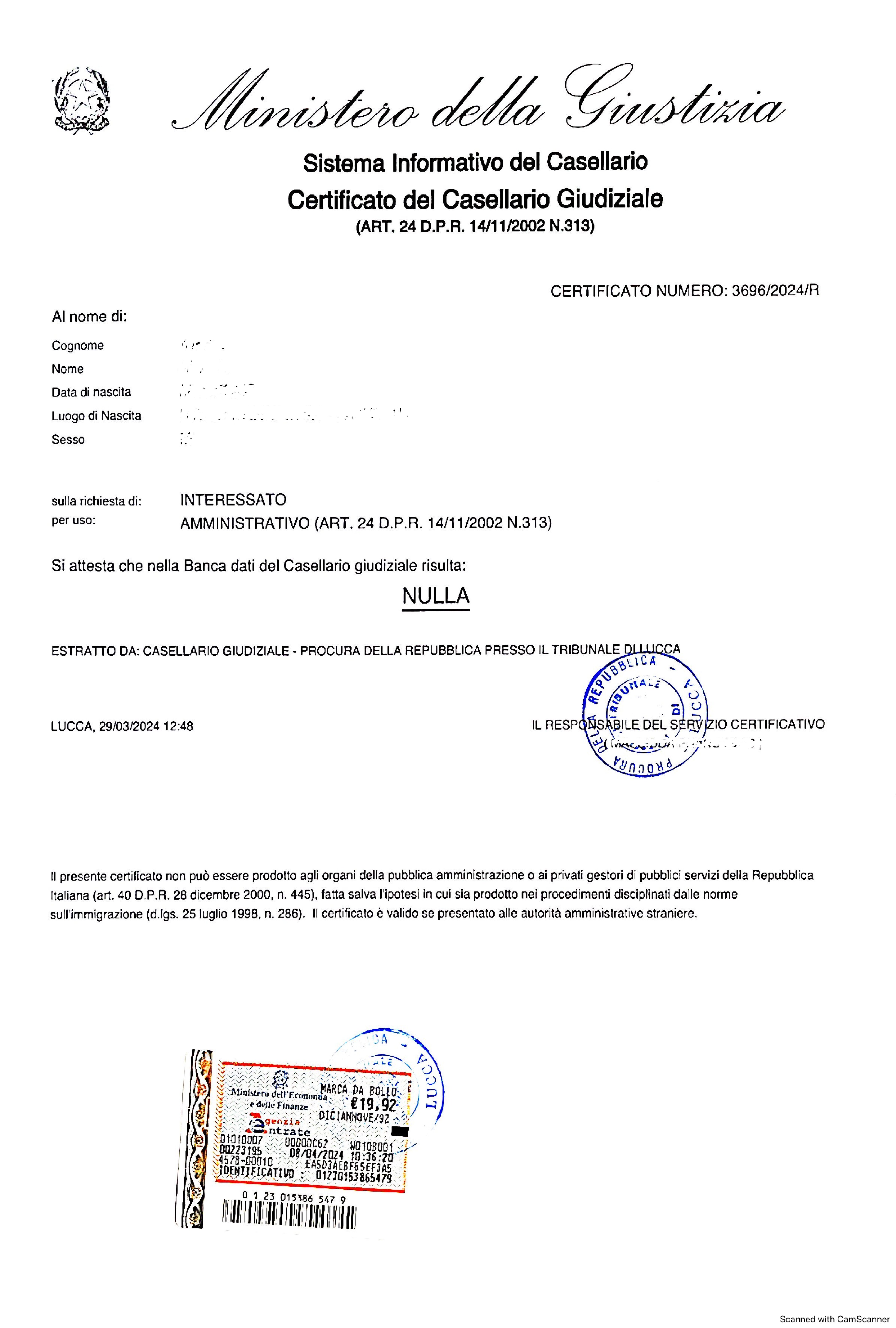Not everyone knows that Article 24 of the Consolidated Law on the Criminal Record allows you to request a criminal record certificate and obtain a partial overview of your criminal situation.
Indice dei contenuti
WHAT’S THE CERTIFICATE FROM THE JUDICIAL RECORDS REGISTER?
The certificate from the judicial records register is a document that collects a person’s criminal history, specifically the convictions that have become final.
The criminal record certificate is the document that lists most (but not all) of the definitive convictions you have received. The criminal record, also known as the criminal certificate from the criminal record, lists the criminal precedents related to a specific person.
Except for the certificate requested by the Judicial Authority, which includes all the criminal precedents of a subject, the law establishes that certain precedents are not reported in other types of certificates. This is to facilitate the social reintegration of the convicted person.
The precedents not included in the certificate are those listed in Article 24, paragraph 1 of the Consolidated Law on the Criminal Record, such as:
- Convictions for which it has been ordered that they not be mentioned in the certificate under Article 175 of the Penal Code, provided that the benefit has not been revoked.
- Convictions for offenses punishable only by fines and convictions for crimes extinguished under Article 167, paragraph 1, of the Penal Code.
- Convictions for offenses for which a special cause of extinction is provided for by Article 556 of the Penal Code.
- Convictions for which amnesty has been definitively applied and for which rehabilitation has been declared, provided that this has not been subsequently revoked.
- Plea bargains when the imposed penalty does not exceed two years of imprisonment alone or combined with a monetary penalty, and penal decrees.
- Convictions for acts that the law has ceased to consider as crimes, provided that the relevant registration has not been removed.
- Judicial measures have declared non-punishability according to Article 131-bis of the Penal Code, provided that the relevant registration has not been removed.
- Measures regarding security measures following acquittal or dismissal sentences, when the measures have been revoked.
- Measures concerning the application of preventive measures of simple special surveillance or with prohibition or obligation of residence.
- Judicial measures issued by the Justice of the Peace.
- Judicial measures relating to crimes under the jurisdiction of the Justice of the Peace issued by a different Judge, limited to the registrations concerning these crimes.
- Measures of interdiction, incapacity, and related to support administration when they have been revoked.
- Measures that, according to Article 464-quater of the Code of Criminal Procedure, provide for the suspension of proceedings with probation.
- Sentences that, according to Article 464-septies of the Code of Criminal Procedure, declare the crime extinguished due to a positive probation outcome.
The criminal record certificate therefore has the following characteristics:
- It is personal: it indicates your first and last name.
- It is valid for six months from the date of issuance.
- You must pay the stamp duty to obtain its release.
WHERE TO REQUEST THE CRIMINAL RECORD CERTIFICATE?
The criminal record certificate can be requested at any Prosecutor’s Office in Italy, regardless of where the conviction occurred. The registrations present in the criminal record are the same throughout the national territory.
WHAT’S THE PURPOSE OF THE CRIMINAL RECORD CERTIFICATE?
The criminal record certificate is usually requested to verify a person’s criminal history. It is needed in various situations, such as:
- Adoption or fostering practices for minors.
- Applications for residence permits.
- Participation in tenders.
- Anti-paedophilia certificate for employment: Article 2 of Legislative Decree No. 39/2014 requires employers hiring a person to perform professional or voluntary activities that involve direct and regular contact with minors to request the criminal record certificate.
DIFFERENCE WITH THE CRIMINAL RECORD REPORT
The report, unlike the certificate, does not have certification efficacy and can therefore not be presented for administrative purposes or work-related reasons. However, it allows the requester to know all definitive judicial measures against them, including those not visible in the certificate, according to Article 24 of the Consolidated Law.
Indeed, the absence of visibility of a conviction in the criminal record does not imply that the measure does not exist.
The report is, therefore, the complete tool to fully understand the judicial situation of the person concerned.
DIFFERENCE WITH THE PENDING CHARGES CERTIFICATE
The pending charges certificate lists ongoing criminal proceedings (not those concluded definitively, as in the criminal record certificate) that have not yet been resolved and must be requested from the Prosecutor’s Office of the Court where the trial is taking place.
DIFFERENCE WITH THE 335 PETION
If you want to know if there are criminal investigations against you or the status of a complaint you filed, you must submit a request under Article 335 of the Code of Criminal Procedure.
You can request it online by CLICKING HERE.
HOW TO REMOVE CERTAIN CRIMES FROM THE CRIMINAL RECORD CERTIFICATE
Even if you have received a definitive conviction, there are ways to prevent it from appearing on the criminal record.
Request for rehabilitation
Rehabilitation is a process through which a convicted person can obtain the extinction of accessory penalties (such as disqualification from certain positions or professions) and the criminal effects of the conviction, therefore, it represents a useful tool to remove a conviction from the criminal record. In fact, after obtaining rehabilitation, the conviction is not eliminated from the criminal record, but a rehabilitation measure is recorded that certifies the extinction of the penalty. Anyone requesting the criminal record certificate after rehabilitation will no longer find the conviction in their extract. However, this information is not valid for public administration or judicial authorities, as in these cases, the conviction remains recorded, accompanied by the annotation of the rehabilitation measure and the extinction of the penalty. Rehabilitation removes the negative effects of the crime.
To request rehabilitation, it is necessary to submit a request to the Surveillance Court, provided that the requirements set out in Article 179 of the Penal Code are met:
- At least 3 years (8 in case of recidivism) must have passed from the day the penalty was executed or extinguished.
- The convicted person must have provided actual and consistent evidence of good conduct.
- The convicted person must have fulfilled civil obligations arising from the crime, such as compensation or restitution.
Extinction of the crime and criminal record
In the case of conditional suspension of the sentence, plea bargaining, or penal decree of conviction, one can request the extinction of the crime through a petition to the executing judge who issued the sentence. The request for extinction of the crime can only be submitted if within 2 years (or 5 for more serious crimes), the applicant has not undergone any further conviction for crimes or misdemeanors of the same nature.
Thanks to the reform of the criminal record (Legislative Decree No. 122/2018), once the crime is declared extinct, the conviction will no longer be visible in the criminal certificate requested by the person concerned.

